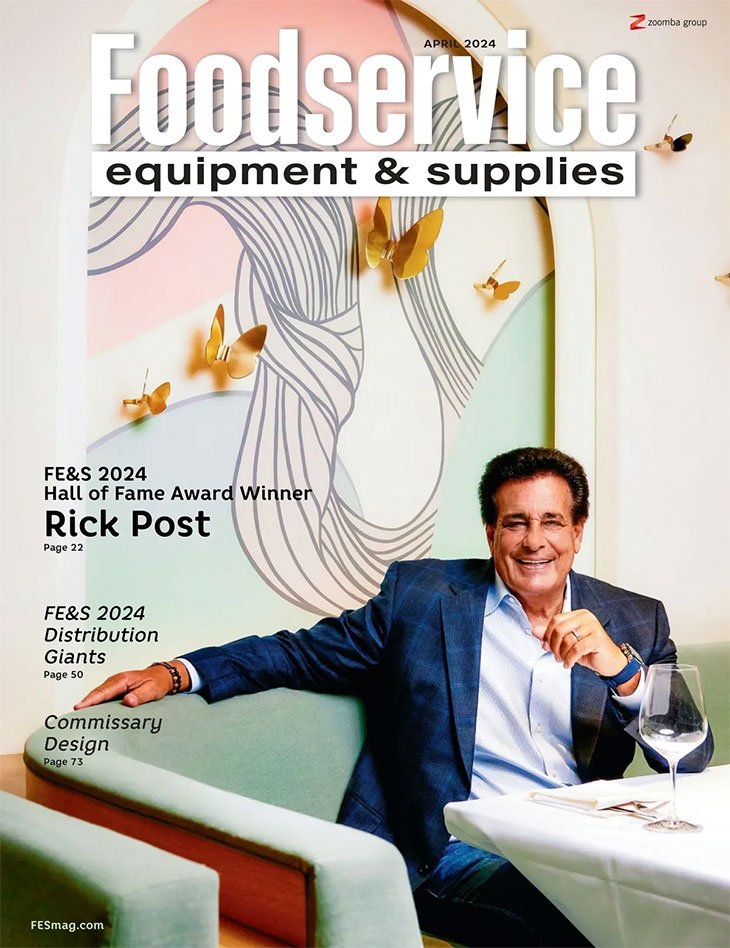For this special Green Tip article, FE&S caught up with five champions of sustainability to hear their thoughts on the state and future of green in the foodservice industry.
Elizabeth Meltz, director of food safety and sustainability, Batali & Bastianich Hospitality Group (B&BHG)
 Her peers look at Meltz as a pioneer in the independent restaurant sector when it comes to planning and executing comprehensive sustainability initiatives, including a full-scale recycling and composting program aimed at getting to zero waste, participation in Meatless Mondays, a no-bottled-water policy and certification through the Green Restaurant Association. Meltz oversees more than two dozen restaurants for B&BHG in New York and across the U.S.
Her peers look at Meltz as a pioneer in the independent restaurant sector when it comes to planning and executing comprehensive sustainability initiatives, including a full-scale recycling and composting program aimed at getting to zero waste, participation in Meatless Mondays, a no-bottled-water policy and certification through the Green Restaurant Association. Meltz oversees more than two dozen restaurants for B&BHG in New York and across the U.S.
FE&S: How do you define sustainability at your company?
EM: Sustainability has to be the total package. Yes, it has to be “green,” but it also has to work and be user friendly. The greenest product in the world doesn’t do me any good if my team doesn’t think the product does the job or we don’t understand how to use it, whether that product’s a chemical-free soap or a dimmable LED light.
FE&S: What’s your view of the state of sustainability in our industry today? Where can we go from here?
EM: I am consistently impressed with the developments in sustainability in our industry. In particular, I love the dichotomy of incredible advancements in food technology with the return to family farms and a focus on GMOs and food deserts.
FE&S: What sustainable steps has your company taken most recently?
EM: We are working on a pilot project, using a product that uses energy-monitoring sensors and software to give us real-time data. This data details the energy consumption of all of our equipment, from refrigeration to HVAC to dishwashing. With that information we can change our behavior (and potentially some equipment), and save energy and money.
FE&S: What are your future goals regarding sustainability and your business?
EM: Work with the Drive Change/Snowday Food Truck and organizations like it to integrate more social justice and social consciousness into our company. Remember, it’s not sustainable unless it works, and an unjust society does not. Sustainability isn’t all about to-go containers (though I am still searching for the perfect solution for those as well).
George McKerrow Jr., CEO, Ted’s Montana Grill
 McKerrow, along with Ted Turner founder and Paula Owens, purchasing and sustainability manager, have led the American West–inspired, Atlanta-based, 46-unit chain toward LEED Gold certification for its Alpharetta restaurant, which opened in October 2014. McKerrow has also helped develop and oversee a lengthy list of green initiatives for the chain, including installing a massive solar panel system, car chargers and LED lighting system-wide, along with other programs and technologies aimed at reducing energy, water and waste.
McKerrow, along with Ted Turner founder and Paula Owens, purchasing and sustainability manager, have led the American West–inspired, Atlanta-based, 46-unit chain toward LEED Gold certification for its Alpharetta restaurant, which opened in October 2014. McKerrow has also helped develop and oversee a lengthy list of green initiatives for the chain, including installing a massive solar panel system, car chargers and LED lighting system-wide, along with other programs and technologies aimed at reducing energy, water and waste.
FE&S: How do you define sustainability?
GM: Sustainability is a whole lot more than just recycling and turning off the water. It’s a mentality we try to instill in our culture. We are constantly thinking about the impact we’re going to have on our communities in both the short and long terms, and we try to lead by example.
FE&S: What’s your view of the state of sustainability in our industry today? Where can we go from here?
GM: I think our industry is significantly more aware than it was 10 years ago, and there has been sustained interest in sustainability — no pun intended — in the last five years. As consumers become more cognizant about sustainability issues, our industry responds to consumer demand with a willingness to find different ways to run their businesses. In the future, we can continue to increase demand for products and services that are less impactful in a negative way on our environment, just like computer chips have become more accessible and affordable over the years. I am confident we can do the right thing.
FE&S: What sustainable steps has your company taken most recently?
GM: Since 2012, we have been in partnership with the Bonneville Environmental Foundation to help restore flow to critically dewatered rivers and streams in the Colorado River Basin. Over the past 2 years, we have helped restore over 5.5 million gallons of water to the Yampa, Roaring Fork and Fraser rivers. This investment in water restoration expands our sustainability efforts beyond simply water conservation. It provides a mechanism for balancing our water footprint while also contributing to environmental restoration efforts in our own backyard.
FE&S: What is the most important sustainability-related issue the industry should be concerned about right now?
GM: Understanding the impact of drought and changing weather patterns and the impact on our water supply is important. At the same time, the planet is being inundated with trash. One of the most important things we can do is concentrate on the cycle of taking what we make and figuring out how to second-purpose it or give it back to Mother Nature.
John Turenne, FCSI, president, Sustainable Food Systems, LLC
 As executive chef at Yale, Turenne started his now successful career in sustainability more than a decade ago and many years before the industry used that term. While at Yale, he transformed the foodservice program to focus on healthy, sustainable food while reducing energy use, water consumption and waste in the kitchen.
As executive chef at Yale, Turenne started his now successful career in sustainability more than a decade ago and many years before the industry used that term. While at Yale, he transformed the foodservice program to focus on healthy, sustainable food while reducing energy use, water consumption and waste in the kitchen.
FE&S: How do you define sustainability?
JT: There are many definitions for sustainability but mine skews more toward the food. I believe sustainable food is a way of producing and consuming food that promotes the continuous well-being of ourselves and our planet. And while the impact of food production on the environment is important, what’s also important is the impact food consumption has on our bodies.
FE&S: What’s top of mind for you when it comes to sustainability these days?
JT: Lately I’ve been more focused on health and well-being and the sustainability of our bodies. We need to be concerned with our own health in addition to the environment — I have been working with more corporations and schools that are looking at the value of employee and student wellness and the value it brings to business and culture. But I also think water conservation is incredibly important. I just got back from a trip to California where that was the ongoing discussion.
FE&S: What’s your view on the state of sustainability in our industry today? Where can we go from here?
JT: We are much more aware of our impact than we have been in the past. At the same time, sustainability has become much more of a marketing approach or tactic, and that’s where the caution should be. Instead of getting too wrapped up in the value of marketing, we need to make sure there’s truth behind our actions and work against greenwashing. If we do the right thing, our customers will notice.
FE&S: What sustainable steps has your company taken most recently?
JT: Managing food production is not that difficult and the easiest way to start reducing food waste. Composting is a great solution for waste management, but it shouldn’t be the first step.
Jamie Moore, director of sourcing and sustainability, Eat’n Park Hospitality Group/Parkhurst Dining Services
 Moore has partnered with countless farms to offer tours and other educational programs geared toward teaching students, faculty and the community at large about sustainable farming and the benefits of supporting local, sustainable food producers. Moore also oversees Parkhurst’s FarmSource program, a local purchasing program supporting local, family-owned farms in the Pittsburgh area.
Moore has partnered with countless farms to offer tours and other educational programs geared toward teaching students, faculty and the community at large about sustainable farming and the benefits of supporting local, sustainable food producers. Moore also oversees Parkhurst’s FarmSource program, a local purchasing program supporting local, family-owned farms in the Pittsburgh area.
FE&S: How do you define sustainability?
JM: I’m heavily involved on the food side of sustainability. What I’m committed to is ensuring that our food is sourced from safe and reliable farmers and suppliers. We strengthen and educate and learn together with the farmers to improve our food system of the future. In addition, we also care about people — we don’t support farms that use pesticides and herbicides that could make the farmers ill. We want to help ensure we have safe, reliable food for future generations.
FE&S: What’s your view on the state of sustainability in the foodservice industry today? Where can we go from here?
JM: I think the foodservice industry is confusing the general public with a lot of sustainable jargon, and there is confusion about terms like “free range” and “cage free” and “hormone free.” One thing we can do as an operator is take student groups and others to farms to show them how food is grown and produced. Communicating the reality of that and teaching others about where our food is coming from will hopefully help clear up some of that ongoing confusion.
FE&S: What’s one sustainable thing everyone should do right now?
JM: Plant a garden — you can even plant one inside. Recently I helped build a garden underneath a stairwell of a business with grow lights and an irrigation system to grow small vegetables for pickling, like turnips, beets, carrots and radishes. It’s also relatively easy to set up an herb garden.
FE&S: What are your future goals regarding sustainability and your business?
JM: Explore ways we can work with our current farmers as well as new ones to extend the growing season. We’re trying to buy food more locally and regionally rather than rely solely on California, which has seemed to struggle with agriculture in recent years because of ongoing drought.
Andrew Shakman, president and CEO, LeanPath Inc.
 The quintessential leader in the conversation about waste, Shakman has inspired, led and assisted countless industry operators, companies, consultants and professionals in reducing food waste.
The quintessential leader in the conversation about waste, Shakman has inspired, led and assisted countless industry operators, companies, consultants and professionals in reducing food waste.
FE&S: How do you define sustainability?
AS: I like the definition of “sustainability” as published in the U.N.’s “Brundtland Report” in 1987: “Sustainability is behavior/development that meets the needs of the present without compromising the ability of future generations to meet their own needs.”
To paraphrase, we act in a sustainable manner when we do things today that we can reasonably expect to continue perpetually without damaging the future for others. Sustainability isn’t just about being green, it’s about engineering our world to not rely on one-time solutions that deplete finite resources or lead to long-term damage to our planet.
FE&S: What’s your view on the state of sustainability in the foodservice industry today? Where can we go from here?
AS: We’re doing many good things in foodservice. We have focused on energy, water and waste while trying to source more sustainable food and supplies. This is all admirable, and it’s making a difference.
Still, we have more work to do, and there are terrific opportunities for us to save a lot of money while making sustainable decisions. For example, although we’ve made progress with energy efficiency and water conservation, we can reduce much more energy and water without hurting our businesses.
Finally, in foodservice we are excellent operators. We see things that need to be improved, and we do it immediately. Unfortunately, with sustainability the easiest answers aren’t always the best answers.
FE&S: What is the most important sustainability-related issue the industry should be concerned about right now?
AS: I would argue that food waste should top our priority list because of what we call the “nexus effect.” Food waste involves wasting all of our resources — water, energy and food.
We’ve all heard the alarming figures — the food we eat makes up more than two-thirds of our total water footprint and consumes 25 percent of our total energy. A single pound of beef takes an average of 1,800 gallons of water to make it to your supermarket. And, as an industry, we’re throwing away a significant percentage of that food in our kitchens — as much as 10 percent of what we buy is trashed before it’s ever served to a customer.
FE&S: What’s one sustainable thing everyone should do right now?
AS: First, all operators should do a waste audit to understand what exactly they’re wasting. You need to understand current waste-generation types and levels to be able to address the problem. Monitoring energy usage has become more common — food waste should also be monitored with the same approach. Without data, you can’t diagnose the issues, inefficiencies or the progress. This is the key to prevention. FE&S




